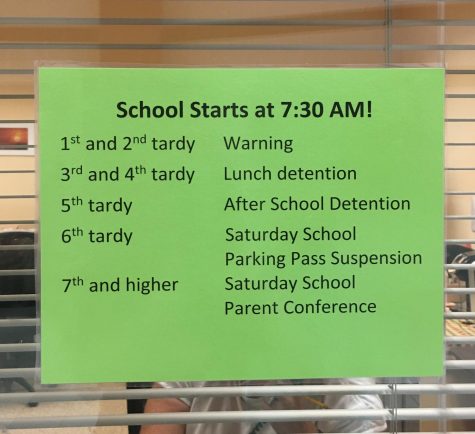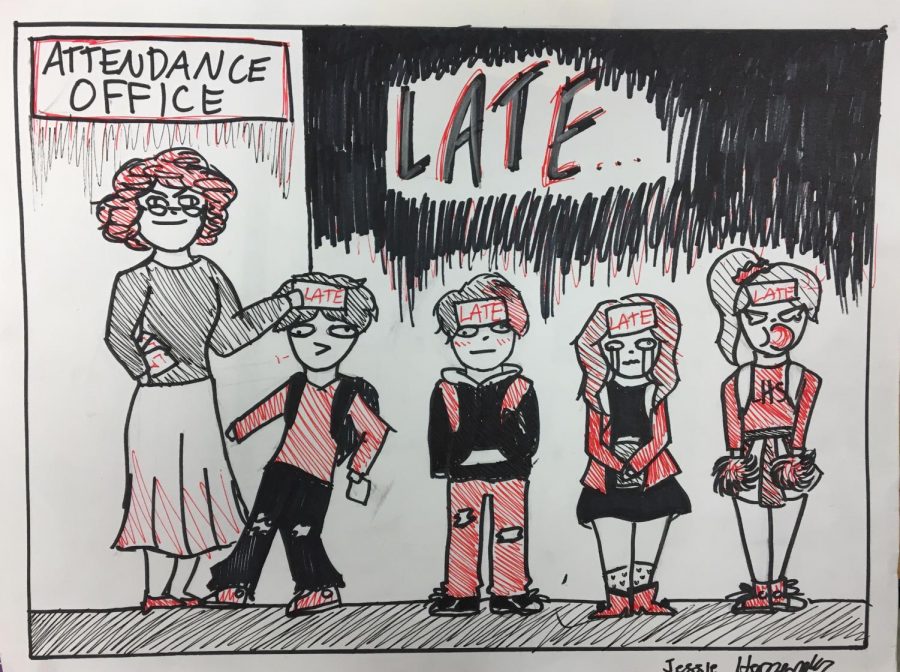LATE: Enforcement of tardy rules means increased lunch detention crowd

More stories from Sierra Rossman
January 24, 2021
Tardy rules have not changed, but enforcement has.
It’s 7:29 a.m and you’re rushing towards the school doors, hoping that you’ll luck out and avoid the infamous “chronically tardy” title that could ruin a student’s reputation with just one mention. You’ve already received two warnings from the attendance office, and, with the strict tardy rules, next is a lunch detention.
Just as you enter the doors, the bell rings, signifying the beginning of a long school day and another late slip. Dejectedly, you walk to the office and receive your lunch detention. Like many students before you, this will not be the last time.
At the beginning of the 2019-2020 school year a new bright green consequences poster was above the attendance window. Although these rules have been present in previous school years, the physical representation of them ensures that students are aware of the consequences. 
At each first week assembly administrators reviewed the consequencs for being tardy. This let the students know that there will be no leniency this year.
The increased severity has already shortened the late to school line.
Attendance secretary Jennifer Twiford confirmed that the number of students that were tardy has decreased since the consequences have been in place.
“It is so important for students to arrive on time because teachers start teaching right away. If you come late to class, that teacher has to stop and bring the student up to speed about what they missed. It’s missed teaching time and disrespectful. I understand we all run late for reasons that might be beyond our control, but try and get to school on time. Make it a habit and before you know it, it will stick,” said Twiford.
Students like senior Kat Taylor have come in contact with these consequences before.
“My brother would drive me to school every day last year, so when he was running late it would affect me getting to school on time. I got several lunch detentions as a result of this and it would completely ruin my day. I was already running late and missing some of class and on top of that I would have to serve lunch detention in front of the entire cafeteria,” said Taylor.
For many, driving and getting a late slip is always better than getting up early and taking the bus.
Punishing a student because they are late could aggravate the situation instead of helping it. The potential of a punishment could also increase a student’s anxiety and they might choose to skip the whole school day, missing valuable teaching material.
Where some believe punishing a student for being tardy is ineffective, others believe that giving two warnings before handing out a lunch detention is too lenient.
Part of not wanting lunch detention is that students are on display at a table in the cafeteria
“An alternative to the consequences would suggest that minor detentions and phone calls to parents are overly harsh. We might be overly fragile if we think that’s the case,” said English teacher Daniel Lake.
“Lateness on its own is not the most pressing concern. The most important factor is the safety of all students, and when students are late and teachers do not know where students are, we cannot be certain they are safe,” Lake added.
With increased attention to safety in schools, a student being where they need to be at that time severely decreases the risk of a negative incident.
Lake, like many other teachers, enforces tardy rules specific to his classroom.
“I give a warning first, then three half-hour after school detentions, a phone call home, and possibly referrals to the administration if the student can’t get it under control,” said Lake.
Lexi Cioffi is a member of the Class of 2021 and believes that missing a part of the school day could set a pattern that would continue into adulthood.
“I think that the tardy consequences are relatively fair to the students because school is a responsibility of all students and coming on time is important. There is also a warning period where students get the opportunity to adapt to their morning routine and get to school on time. It’s important to be on time because it’s important to show commitment and responsibility in a similar way that adults are expected to when they have a job,” said Cioffi.
Although many high school students regularly stay up late to complete assignments and study, it is important to arrive at school on time. This will not only set positive habits, but set the student up for academic success.
Your donation will support the student journalists of Linganore High School. Your contribution will allow us to purchase camera/recording equipment and software. We hope to raise enough money to re-start a monthly printed issue of our paper.



